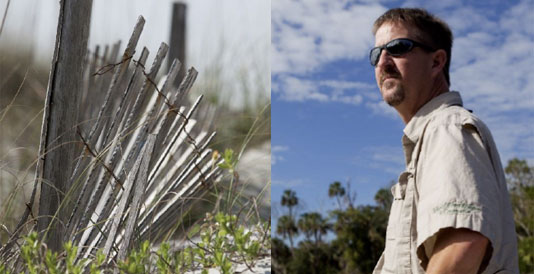 October 28, 2016 (By Hannah O. Brown, UF/SNRE) - In less than a year, Russell Anderson plans to be working hands-on, surveying coastal planning projects worldwide. Anderson is a second-year master’s student studying sustainable development, and he is one of a number of students who have decided to pursue UF’s Concentration in Climate Science, an interdisciplinary concentration through the School of Natural Resources and Environment and in collaboration with the Florida Climate Institute. “Internationally, everybody is really trying to plan for the population of what will happen by 2050, with 70 percent of people being in low-lying urban areas,” Anderson said. “That’s over 7 billion people, coast-to-coastline, all stuck in urban centers.” Through taking classes within the concentration, Anderson has gained professional skills and insight into climate change issues on a global scale. “It really made sense based on my professional interest long term, and it was also a chance to really get educated about [climate change effects] that we are already starting to see happening in certain areas,” Anderson said.
October 28, 2016 (By Hannah O. Brown, UF/SNRE) - In less than a year, Russell Anderson plans to be working hands-on, surveying coastal planning projects worldwide. Anderson is a second-year master’s student studying sustainable development, and he is one of a number of students who have decided to pursue UF’s Concentration in Climate Science, an interdisciplinary concentration through the School of Natural Resources and Environment and in collaboration with the Florida Climate Institute. “Internationally, everybody is really trying to plan for the population of what will happen by 2050, with 70 percent of people being in low-lying urban areas,” Anderson said. “That’s over 7 billion people, coast-to-coastline, all stuck in urban centers.” Through taking classes within the concentration, Anderson has gained professional skills and insight into climate change issues on a global scale. “It really made sense based on my professional interest long term, and it was also a chance to really get educated about [climate change effects] that we are already starting to see happening in certain areas,” Anderson said.
The idea for the UF Climate Science Concentration was first conceived by faculty who were considering the notion of establishing a certificate program, geared toward professionals. With the basic structure of the concentration already in motion, SNRE Director Tom Frazer suggested FCI and SNRE switch their focus, in the short term, to enhancing the skills of graduate students instead. “I suggested that there was actually a more immediate need to offer those courses to our students rather than the place-based professionals,” Frazer said. “And a concentration, at the time, was a more effective way to start to put a focus on climate in the curriculum.”
The FCI faculty advisory committee, which is made up of professors from biology, geology, SNRE, forestry, Latin American studies and geography, approved the first list of courses for the concentration in the fall of 2014. The concentration is divided into four categories of study: principles of climate science, system-specific climate science, quantitative methods and human dimensions. Students pursuing the concentration are required to take at least one course from each category, for a total of 12 credit hours.
Carolyn Cox, UF coordinator for the Florida Climate Institute, said the human-dimensions component of the program is just as important as the scientific training. “There’s so many people who work in different disciplines who use climate science, and there is always this need for how to talk to people about it,” she said. While it has become increasingly important for researchers to effectively communicate about their findings, Cox believes there is still resistance from many scientists who prefer to focus simply on the science. However, Cox said that the problem with this reluctance is that some of these scientists lack the skillset to see through the tactics that others use to discredit their research. “Even scientists, people that are very pro-climate science and advocate climate science, they still fall into that trap of calling it a debate,” Cox said. “It’s not a debate. A debate is when there are actually two sides to a story. There’s not really two sides here. There’s a manufactured side and a real side.” Cox hopes that the Climate Science Concentration can help teach the skills needed to accurately represent climate-related research even when confronted with skepticism and denial. “People need to know how not to fall into those traps,” she said, “how to stay dignified, not fall into the he-said-she-said garbage and not embarrass themselves.”
For Frazer, it’s particularly important to provide the opportunity for SNRE students to focus on climate science through a concentration, because it gives those students a chance to specialize, making their skills more marketable in the professional world. “There is a real risk in getting an interdisciplinary degree where the emphasis is simply on breadth,” he said, “but one of the ways that you deal with depth and the ability to convince a potential employer, whether it’s in an academic setting, a government setting or some other work-related environment, is that you actually have a focus area.” Frazer said having concentrations is one way for SNRE students to showcase the particular skills they acquire while pursuing their degree. “It provides depth,” he said. “Recognizable, identifiable, demonstrable depth in a subject area that complements the broader interdisciplinary degree.” Future plans for the concentration include the possibility of offering a travel stipend to students who are interested in attending climate-science conferences, workshops and giving presentations. Cox said she is still hoping to expand the program to include a certificate, allowing professionals as well as students to become more aware of the science and better able to communicate it.











